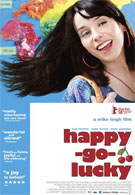A little while ago the Onion AV Club coined the term “Manic Pixie Dream Girl,” describing a type of female character that has plagued a certain kind of navel-gazing male filmmaking this decade. She's Natalie Portman's character in Garden State, Kate Hudson in Almost Famous, Jennifer Aniston in Along Came Polly-- free-spirited, gorgeous women with no inner lives of their own, just enough “depth” and “sense of adventure” to inspire a schlubby guy to break out of his mold and tap into life, or some other kind of nonsense.
With Poppy, the main character of Happy-Go-Lucky, writer-director Mike Leigh has taken a Manic Pixie Dream Girl and giving her her own movie-- and with that, the opportunity to turn into a real person. Freed from the duty of changing the life of some ordinary man-- though eventually she begins to do just that-- Poppy simply lives on the screen, in an episodic, sometimes aimless film that simply tries to show what it's like to be someone who is relentlessly optimistic. With Sally Hawkins dazzling in the lead role, Poppy's cheery disposition never seems cloying, naïve or even unrealistic. In fact, given the circumstances of both her world and ours, it might be the only reasonable way to live.
A Londoner nearing 30, Poppy lives with her sarcastic but loving roommate Zoe (Alexis Zegerman) in a cozy flat, both of them elementary school teachers with a penchant for art projects. When Poppy's well-loved bicycle is stolen, she signs up for driving lessons, paired with the tightly wound Scott (Eddie Marsan), in perhaps the worst student-teacher matchup in history.
For a while you empathize with Scott's irritation, when Poppy jokes by taking her hands off the wheel and mocks the teaching system he's established. But his irritation soon gives way to a weird, creepy tension, and his last few scenes with Poppy are some of the most uncomfortable you've ever seen when one character refuses to break her smile.
Amid the driving lessons, which make up the movie's best excuse for a plot, Poppy pays a visit to a flamenco dancing class with a co-worker, has a strange and scary conversation with a mentally ill homeless man, visits her pregnant older sister in the suburbs and realizes how jealous she is of Poppy's simpler life, and copes with a young bully in her class, meeting cute with a handsome social worker (Samuel Roukin) while she's at it. Each vignette, none of which really connect to one another or the main story, give Poppy another opportunity to bounce back from a setback, while demonstrating genuine empathy for people who can't quite get on board her optimistic ethos-- that is, the rest of the world.
What separates Poppy from a Pollyanna or a Disney princess is her ability to live in the real world, where bikes are stolen and kids are bullied, without running away from sadness or ignoring it entirely. She can put on a serious face, as she does when talking to the school bully, and even physically defend herself, as she is forced to do when Scott's behavior grows even stranger. Leigh and Hawkins together make it clear that Poppy's happy-go-lucky attitude is a choice, not a defense mechanism or character defect. It's just up to the rest of us to choose to see it that way as well.
Happy-Go-Lucky has very few laugh-out-loud moments, but it does leave you with a spring in your step, a sense that Poppy's point-of-view is possible if you try. The movie's episodic structure is frustrating at times, but Poppy is the rare film character with whom we can just settle down with and follow around, knowing the adventure will be worth our time. Unlike the Manic Pixie Dream Girl, a collection of quirks seemingly whipped up for the sole purpose of being a love interest, Poppy is almost a real person, waiting for us somewhere in London, humming to herself and wearing her favorite tan boots.
Staff Writer at CinemaBlend












